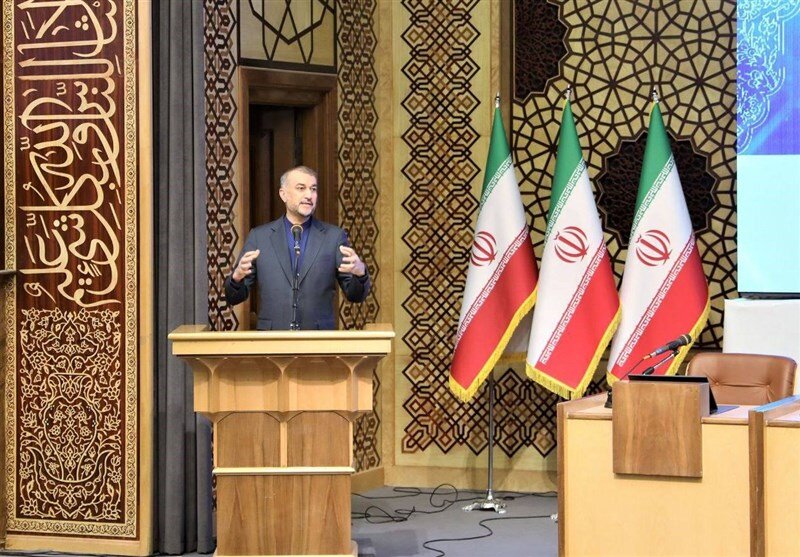TEHRAN- According to Iranian Foreign Minister Hossein Amir-Abdollahian, Hamas notified Iran that it has adequate capability to press ahead with the conflict with Israel in the beleaguered Gaza Strip for months.
Addressing a conference of clerics and seminary teachers, held in the holy city of Qom on Thursday, Amir Abollahian declared that more than 80 days had passed since the Gaza war, yet “the Zionist regime has achieved nothing.”
“According to Hamas commanders, only 14% of the resistance capacity has been damaged so far,” the foreign minister said.
According to Amir Adbollahian, the length of Hamas tunnels currently exceeds the region of Gaza, and drone production operations have not been shuttered for even an hour since Operation Al-Aqsa Storm on Oct. 7.
“Hamas captured valuable security and military forces of the Zionist regime on the first day of Operation Al-Aqsa Storm,” he went on to say.
The minister mentioned the resistance’s growing popularity, stating that Hamas now controls both Gaza and the ongoing war.
“After the Al-Aqsa Storm, more than 70% of the people of Gaza took up arms and came to the battlefield,” he said. “After breaking the wall, all the Palestinian youth and people came to the arena and defended their country.”
“The Zionist regime, meanwhile, has changed its goal in Gaza several times, but has failed,” the minister added.
Amir Abdollahian discussed the U.S. full backing for the Israeli assault on Gaza as well as Washington’s constant assurances to Iran that it did not want the conflict to spread, pleading with the Islamic Republic to assist in preventing a war spillover.
“At every stage, they were given a strong response and the establishment responded to them at the official level,” he stressed.
“America is lying when it says it is not seeking to expand the war,” he said, adding if the Americans were not looking to expand the war, they would not be delivering their equipment and weapons to Israel day and night.
“Today, American weapons are arriving in Tel Aviv from all the bases in the region without stop. In addition, some equipment also arrives directly from America in Cyprus and goes to Tel Aviv from Cyprus.”
The proposal of taking advantage of Iran’s ties to the resistance for post-war planning in Gaza was also presented before the UN; nevertheless, he said, “We declared that the Palestinian people should be the decision-makers themselves.”
Amir Abollahian mentioned resistance movements while discussing the advent of new world powers.
“The emerging powers do not mean only China’s economy. Today, resistance has become a power,” the minister said, referring to anti-U.S. groups in Palestine, Lebanon, Syria, Iraq and Yemen.
Additionally, Amir Abdollahian expressed utmost admiration for the Yemenis and Hezbollah in Lebanon, praising their valiant actions during the conflict.
Alluding to the country’s interception and targeting of Israeli ships and vessels bound for Israeli ports in Bab el-Mandeb, he continued that “today, Yemen has created a new legal regime in the Red Sea.”
“Today, the leaders of the resistance have reached a high level of foresight and understanding and have shown this in the recent war.”
Amir Abdollahian also underlined “many measures taken by the Islamic Republic of Iran in creating the Axis of Resistance to ensure security in the region.”
“Today there is no need for the Islamic Republic to take any action,” he noted.
The developments are part of evolving concepts and mechanisms in the world, where the U.S. hegemony is on the decline.
“One development is that the exercise of American hegemonic power is weakening day by day. Today, a resistance group has destroyed the army that considered itself the third military power in the world,” he averred.
“Today, in the White House, the issue is raised as to why support for Israel is to such an extent that Israel’s defeat is considered America’s defeat.”
Amir Abdollahian mentioned another encouraging point, stating that Iran has started repairing its fences with Egypt after improving relations with Saudi Arabia.
He said the recent phone conversation between Ebrahim Raisi and Abdel Fattah el-Sisi aimed to talk about the recent events in Gaza and the possibility of reestablishing diplomatic relations between their two nations. “The recent contact between the Iranian and Egyptian presidents was in this context.”


No comments:
Post a Comment